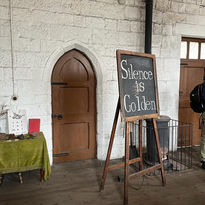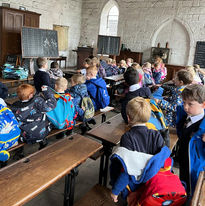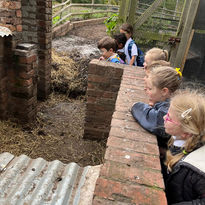
Intent
At The Grange, the History curriculum is designed to develop pupils’ curiosity about the past, their understanding of chronology, and their ability to think critically and historically.
The curriculum is knowledge-rich and carefully sequenced, enabling pupils to:
-
Develop a secure chronological understanding
-
Know and remember significant events, people and periods
-
Understand concepts such as cause and consequence, change and continuity, similarity and difference
-
Use evidence to form and justify historical interpretations
History supports pupils in understanding their place in the world and developing respect for different cultures, societies and perspectives, reflecting The Grange Way.
Implementation
History is taught through well-structured units that build progressively from changes within living memory to complex thematic and chronological studies.
-
Learning is sequenced to ensure pupils build knowledge over time
-
Key historical vocabulary is explicitly taught and revisited
-
Pupils work with a range of sources, including artefacts, images and texts
-
Lessons promote historical enquiry through questioning, discussion and reasoning
Teaching is adapted to ensure all pupils, including those with SEND and disadvantaged pupils, can access the curriculum and achieve well.
Cross-Curricular Links (History)
History at The Grange is purposefully connected to wider curriculum learning, enabling pupils to deepen understanding and apply transferable skills while maintaining strong historical discipline.
-
Reading – Pupils read high-quality historical texts and sources to build knowledge, vocabulary and inference skills.
-
Writing – Pupils write for a range of historical purposes, including explanation, narration, comparison and argument, using subject-specific vocabulary accurately.
-
Geography – Links are made through the study of settlement, migration, land use and place, helping pupils understand how geography has shaped history.
-
Mathematics – Pupils use timelines, dates and duration to develop secure chronological understanding and structure historical thinking.
-
PSHE and Citizenship – History supports understanding of democracy, rights, justice and diversity through the study of past societies and events.
-
These links ensure history is relevant, meaningful and connected, while historical knowledge remains the driver of learning.
Impact
By the end of each key stage, pupils:
-
Demonstrate secure knowledge of key historical periods and concepts
-
Use chronological frameworks confidently
-
Explain historical events using evidence and appropriate vocabulary
-
Show curiosity and respect for the past and its impact on the present
Pupils are well prepared for further historical study and demonstrate strong retention of knowledge over time.
Pupils engage positively in history lessons. They listen attentively, ask thoughtful questions and participate confidently in discussion and enquiry. Behaviour supports learning and reflects The Grange Way.
Personal Development and History
History makes a strong contribution to pupils’ personal development by:
-
Developing empathy and understanding of different perspectives
-
Encouraging critical thinking and reflection
-
Supporting cultural awareness and respect
Leadership and Management (History)
History is led effectively to ensure clear progression, consistent expectations and high-quality teaching. Subject leadership monitors coverage, progression and impact to ensure pupils know more and remember more over time.
History and The Grange Way
Through history, pupils are supported to:
-
Listen to learn through enquiry and discussion
-
Care for everyone and everything by understanding different cultures and societies
-
Work hard and challenge themselves through analysis and interpretation
Links
Horrible Histories - CBBC - BBC


























